Das Buch kann nicht als Datei heruntergeladen werden, kann aber in unserer App oder online auf der Website gelesen werden.
Buch lesen: "The Mystery of the Blue Train"

The Mystery of the Blue Train

Published by HarperCollinsPublishers Ltd
1 London Bridge Street
London SE1 9GF
First published in Great Britain by
Collins 1928
Agatha Christie® Poirot® The Mystery of the Blue Train™
Copyright © 1928 Agatha Christie Limited. All rights reserved.
Cover layout design © HarperCollinsPublishers Ltd 2015
Title lettering by Ghost Design
Cover photograph © Marcus Appelt/Arcangel Images
Agatha Christie asserts the moral right to be identified as the author of this work.
A catalogue copy of this book is available from the British Library.
This novel is entirely a work of fiction. The names, characters and incidents portrayed in it are the work of the author’s imagination. Any resemblance to actual persons, living or dead, events or localities is entirely coincidental.
All rights reserved under International and Pan-American Copyright Conventions. By payment of the required fees, you have been granted the non-exclusive, non-transferable right to access and read the text of this e-book on screen. No part of this text may be reproduced, transmitted, down-loaded, decompiled, reverse engineered, or stored in or introduced into any information storage and retrieval system, in any form or by any means, whether electronic or mechanical, now known or hereinafter invented, without the express written permission of HarperCollins.
Source ISBN: 9780008129484
Ebook Edition © May 2015 ISBN: 9780007422609
Version: 2017-04-13
TO THE TWO DISTINGUISHED MEMBERS OF THE O.F.D. CARLOTTA AND PETER
Contents
Cover
Title Page
Copyright
Dedication
CHAPTER 1: The Man With the White Hair
CHAPTER 2: M. le Marquis
CHAPTER 3: Heart of Fire
CHAPTER 4: In Curzon Street
CHAPTER 5: A Useful Gentleman
CHAPTER 6: Mirelle
CHAPTER 7: Letters
CHAPTER 8: Lady Tamplin Writes a Letter
CHAPTER 9: An Offer Refused
CHAPTER 10: On the Blue Train
CHAPTER 11: Murder
CHAPTER 12: At the Villa Marguerite
CHAPTER 13: Van Aldin Gets a Telegram
CHAPTER 14: Ada Mason’s Story
CHAPTER 15: The Comte de la Roche
CHAPTER 16: Poirot Discusses the Case
CHAPTER 17: An Aristocratic Gentleman
CHAPTER 18: Derek Lunches
CHAPTER 19: An Unexpected Visitor
CHAPTER 20: Katherine Makes a Friend
CHAPTER 21: At the Tennis
CHAPTER 22: M. Papopolous Breakfasts
CHAPTER 23: A New Theory
CHAPTER 24: Poirot Gives Advice
CHAPTER 25: Defiance
CHAPTER 26: A Warning
CHAPTER 27: Interview With Mirelle
CHAPTER 28: Poirot Plays the Squirrel
CHAPTER 29: A Letter From Home
CHAPTER 30: Miss Viner Gives Judgment
CHAPTER 31: Mr Aarons Lunches
CHAPTER 32: Katherine and Poirot Compare Notes
CHAPTER 33: A New Theory
CHAPTER 34: The Blue Train Again
CHAPTER 35: Explanations
CHAPTER 36: By the Sea
Also by Agatha Christie
About the Publisher
CHAPTER 1
The Man with the White Hair
It was close on midnight when a man crossed the Place de la Concorde. In spite of the handsome fur coat which garbed his meagre form, there was something essentially weak and paltry about him.
A little man with a face like a rat. A man, one would say, who could never play a conspicuous part, or rise to prominence in any sphere. And yet, in leaping to such a conclusion, an onlooker would have been wrong. For this man, negligible and inconspicuous as he seemed, played a prominent part in the destiny of the world. In an Empire where rats ruled, he was the king of the rats.
Even now, an Embassy awaited his return. But he had business to do first—business of which the Embassy was not officially cognizant. His face gleamed white and sharp in the moonlight. There was the least hint of a curve in the thin nose. His father had been a Polish Jew, a journeyman tailor. It was business such as his father would have loved that took him abroad tonight.
He came to the Seine, crossed it, and entered one of the less reputable quarters of Paris. Here he stopped before a tall, dilapidated house and made his way up to an apartment on the fourth floor. He had barely time to knock before the door was opened by a woman who had evidently been awaiting his arrival. She gave him no greeting, but helped him off with his overcoat and then led the way into the tawdrily furnished sitting-room. The electric light was shaded with dirty pink festoons, and it softened, but could not disguise, the girl’s face with its mask of crude paint. Could not disguise, either, the broad Mongolian cast of her countenance. There was no doubt of Olga Demiroff’s profession, nor of her nationality.
‘All is well, little one?’
‘All is well, Boris Ivanovitch.’
He nodded, murmuring: ‘I do not think I have been followed.’
But there was anxiety in his tone. He went to the window, drawing the curtains aside slightly, and peering carefully out. He started away violently.
‘There are two men—on the opposite pavement. It looks to me—’ He broke off and began gnawing at his nails—a habit he had when anxious.
The Russian girl was shaking her head with a slow, reassuring action.
‘They were here before you came.’
‘All the same, it looks to me as though they were watching this house.’
‘Possibly,’ she admitted indifferently.
‘But then—’
‘What of it? Even if they know—it will not be you they will follow from here.’
A thin, cruel smile came to his lips.
‘No,’ he admitted, ‘that is true.’
He mused for a minute or two, and then observed,
‘This damned American—he can look after himself as well as anybody.’
‘I suppose so.’
He went again to the window.
‘Tough customers,’ he muttered, with a chuckle. ‘Known to the police, I fear. Well, well, I wish Brother Apache good hunting.’
Olga Demiroff shook her head.
‘If the American is the kind of man they say he is, it will take more than a couple of cowardly apaches to get the better of him.’ She paused. ‘I wonder—’
‘Well?’
‘Nothing. Only twice this evening a man has passed along this street—a man with white hair.’
‘What of it?’
‘This. As he passed those two men, he dropped his glove. One of them picked it up and returned it to him. A threadbare device.’
‘You mean—that the white-haired man is—their employer?’
‘Something of the kind.’
The Russian looked alarmed and uneasy.
‘You are sure—the parcel is safe? It has not been tampered with? There has been too much talk…much too much talk.’
He gnawed his nails again.
‘Judge for yourself.’
She bent to the fireplace, deftly removing the coals. Underneath, from amongst the crumpled balls of newspaper, she selected from the very middle an oblong package wrapped round with grimy newspaper, and handed it to the man.
‘Ingenious,’ he said, with a nod of approval.
‘The apartment has been searched twice. The mattress on my bed was ripped open.’
‘It is as I said,’ he muttered. ‘There has been too much talk. This haggling over the price—it was a mistake.’
He had unwrapped the newspaper. Inside was a small brown paper parcel. This in turn he unwrapped, verified the contents, and quickly wrapped it up once more. As he did so, an electric bell rang sharply.
‘The American is punctual,’ said Olga, with a glance at the clock.
She left the room. In a minute she returned ushering in a stranger, a big, broad-shouldered man whose transatlantic origin was evident. His keen glance went from one to the other.
‘M. Krassnine?’ he inquired politely.
‘I am he,’ said Boris. ‘I must apologize for—for the unconventionality of this meeting-place. But secrecy is urgent. I—I cannot afford to be connected with this business in any way.’
‘Is that so?’ said the American politely.
‘I have your word, have I not, that no details of this transaction will be made public? That is one of the conditions of—sale.’
The American nodded.
‘That has already been agreed upon,’ he said indifferently. ‘Now, perhaps, you will produce the goods.’
‘You have the money—in notes?’
‘Yes,’ replied the other.
He did not, however, make any attempt to produce it. After a moment’s hesitation, Krassnine gestured towards the small parcel on the table.
The American took it up and unrolled the wrapping paper. The contents he took over to a small electric lamp and submitted them to a very thorough examination. Satisfied, he drew from his pocket a thick leather wallet and extracted from it a wad of notes. These he handed to the Russian, who counted them carefully.
‘All right?’
‘I thank you, Monsieur. Everything is correct.’
‘Ah!’ said the other. He slipped the brown paper parcel negligently into his pocket. He bowed to Olga. ‘Good evening, Mademoiselle. Good evening, M. Krassnine.’
He went out, shutting the door behind him. The eyes of the two in the room met. The man passed his tongue over his dry lips.
‘I wonder—will he ever get back to his hotel?’ he muttered.
By common accord, they both turned to the window. They were just in time to see the American emerge into the street below. He turned to the left and marched along at a good pace without once turning his head. Two shadows stole from a doorway and followed noiselessly. Pursuers and pursued vanished into the night. Olga Demiroff spoke.
‘He will get back safely,’ she said. ‘You need not fear—or hope—whichever it is.’
‘Why do you think he will be safe?’ asked Krassnine curiously.
‘A man who has made as much money as he has could not possibly be a fool,’ said Olga. ‘And talking of money—’
She looked significantly at Krassnine.
‘Eh?’
‘My share, Boris Ivanovitch.’
With some reluctance, Krassnine handed over two of the notes. She nodded her thanks, with a complete lack of emotion, and tucked them away in her stocking.
‘That is good,’ she remarked, with satisfaction.
He looked at her curiously.
‘You have no regrets, Olga Vassilovna?’
‘Regrets? For what?’
‘For what has been in your keeping. There are women—most women, I believe, who go mad over such things.’
She nodded reflectively.
‘Yes, you speak truth there. Most women have that madness. I—have not. I wonder now—’ She broke off.
‘Well?’ asked the other curiously.
‘The American will be safe with them—yes, I am sure of that. But afterwards—’
‘Eh? What are you thinking of ?’
‘He will give them, of course, to some woman,’ said Olga thoughtfully. ‘I wonder what will happen then…’
She shook herself impatiently and went over to the window. Suddenly she uttered an exclamation and called to her companion.
‘See, he is going down the street now—the man I mean.’
They both gazed down together. A slim, elegant figure was progressing along at a leisurely pace. He wore an opera hat and a cloak. As he passed a street lamp, the light illuminated a thatch of thick white hair.
CHAPTER 2
M. le Marquis
The man with the white hair continued on his course, unhurried, and seemingly indifferent to his surroundings. He took a side turning to the right and another one to the left. Now and then he hummed a little air to himself.
Suddenly he stopped dead and listened intently. He had heard a certain sound. It might have been the bursting of a tyre or it might have been—a shot. A curious smile played round his lips for a minute. Then he resumed his leisurely walk.
On turning a corner he came upon a scene of some activity. A representative of the law was making notes in a pocket-book, and one or two late passers-by had collected on the spot. To one of these the man with the white hair made a polite request for information.
‘Something has been happening, yes?’
‘Mais oui, Monsieur. Two apaches set upon an elderly American gentleman.’
‘They did him no injury?’
‘No, indeed.’ The man laughed. ‘The American, he had a revolver in his pocket, and before they could attack him, he fired shots so closely round them that they took alarm and fled. The police, as usual, arrived too late.’
‘Ah!’ said the inquirer.
He displayed no emotion of any kind.
Placidly and unconcernedly he resumed his nocturnal strolling. Presently he crossed the Seine and came into the richer areas of the city. It was some twenty minutes later that he came to a stop before a certain house in a quiet but aristocratic thoroughfare.
The shop, for shop it was, was a restrained and unpretentious one. D. Papopolous, dealer in antiques, was so known to fame that he needed no advertisement, and indeed most of his business was not done over a counter. M. Papopolous had a very handsome apartment of his own overlooking the Champs Elysées, and it might reasonably be supposed that he would have been found there and not at his place of business at such an hour, but the man with the white hair seemed confident of success as he pressed the obscurely placed bell, having first given a quick glance up and down the deserted street.
His confidence was not misplaced. The door opened and a man stood in the aperture. He wore gold rings in his ears and was of a swarthy cast of countenance.
‘Good evening,’ said the stranger. ‘Your master is within?’
‘The master is here, but he does not see chance visitors at this time of night,’ growled the other.
‘I think he will see me. Tell him that his friend M. le Marquis is here.’
The man opened the door a little wider and allowed the visitor to enter.
The man who gave his name as M. le Marquis had shielded his face with his hand as he spoke. When the man-servant returned with the information that M. Papopolous would be pleased to receive the visitor a further change had taken place in the stranger’s appearance. The man-servant must have been very unobservant or very well trained, for he betrayed no surprise at the small black satin mask which hid the other’s features. Leading the way to a door at the end of the hall, he opened it and announced in a respectful murmur: ‘M. le Marquis.’
The figure which rose to receive this strange guest was an imposing one. There was something venerable and patriarchal about M. Papopolous. He had a high domed forehead and a beautiful white beard. His manner had in it something ecclesiastical and benign.
‘My dear friend,’ said M. Papopolous.
He spoke in French and his tones were rich and unctuous.
‘I must apologise,’ said the visitor, ‘for the lateness of the hour.’
‘Not at all. Not at all,’ said M. Papopolous—‘an interesting time of night. You have had, perhaps, an interesting evening?’
‘Not personally,’ said M. le Marquis.
‘Not personally,’ repeated M. Papopolous, ‘no, no, of course not. And there is news, eh?’
He cast a sharp glance sideways at the other, a glance that was not ecclesiastical or benign in the least.
‘There is no news. The attempt failed. I hardly expected anything else.’
‘Quite so,’ said M. Papopolous: ‘anything crude—’
He waved his hand to express his intense distaste for crudity in any form. There was indeed nothing crude about M. Papopolous nor about the goods he handled. He was well known in most European courts, and kings called him Demetrius in a friendly manner. He had the reputation for the most exquisite discretion. That, together with the nobility of his aspect, had carried him through several very questionable transactions.
‘The direct attack—’ said M. Papopolous. He shook his head. ‘It answers sometimes—but very seldom.’
The other shrugged his shoulders.
‘It saves time,’ he remarked, ‘and to fail costs nothing—or next to nothing. The other plan—will not fail.’
‘Ah,’ said M. Papopolous, looking at him keenly.
The other nodded slowly.
‘I have great confidence in your—er—reputation,’ said the antique dealer.
M. le Marquis smiled gently.
‘I think I may say,’ he murmured, ‘that your confidence will not be misplaced.’
‘You have unique opportunities,’ said the other, with a note of envy in his voice.
‘I make them,’ said M. le Marquis.
He rose and took up the cloak which he had thrown carelessly on the back of a chair.
‘I will keep you informed, M. Papopolous, through the usual channels, but there must be no hitch in your arrangements.’
M. Papopolous was pained.
‘There is never a hitch in my arrangements,’ he complained.
The other smiled, and without any further word of adieu he left the room, closing the door behind him.
M. Papopolous remained in thought for a moment, stroking his venerable white beard, and then moved across to a second door which opened inwards. As he turned the handle, a young woman, who only too clearly had been leaning against it with her ear to the keyhole, stumbled headlong into the room. M. Papopolous displayed neither surprise nor concern. It was evidently all quite natural to him.
‘Well, Zia?’ he asked.
‘I did not hear him go,’ explained Zia.
She was a handsome young woman, built on Junoesque lines, with dark flashing eyes and such a general air of resemblance to M. Papopolous that it was easy to see they were father and daughter.
‘It is annoying,’ she continued vexedly, ‘that one cannot see through a keyhole and hear through it at the same time.’
‘It has often annoyed me,’ said M. Papopolous, with great simplicity.
‘So that is M. le Marquis,’ said Zia slowly. ‘Does he always wear a mask, Father?’
‘Always.’
There was a pause.
‘It is the rubies, I suppose?’ asked Zia.
Her father nodded.
‘What do you think, my little one?’ he inquired, with a hint of amusement in his beady black eyes.
‘Of M. le Marquis?’
‘Yes.’
‘I think,’ said Zia slowly, ‘that it is a very rare thing to find a well-bred Englishman who speaks French as well as that.’
‘Ah!’ said M. Papopolous, ‘so that is what you think.’
As usual, he did not commit himself, but he regarded Zia with benign approval.
‘I thought, too,’ said Zia, ‘that his head was an odd shape.’
‘Massive,’ said her father—‘a trifle massive. But then that effect is always created by a wig.’
They both looked at each other and smiled.
CHAPTER 3
Heart of Fire
Rufus Van Aldin passed through the revolving doors of the Savoy, and walked to the reception desk. The desk clerk smiled a respectful greeting.
‘Pleased to see you back again, Mr Van Aldin,’ he said.
The American millionaire nodded his head in a casual greeting.
‘Everything all right?’ he asked.
‘Yes, sir. Major Knighton is upstairs in the suite now.’
Van Aldin nodded again.
‘Any mail?’ he vouchsafed.
‘They have all been sent up, Mr Van Aldin. Oh! wait a minute.’
He dived into a pigeon-hole, and produced a letter.
‘Just come this minute,’ he explained.
Rufus Van Aldin took the letter from him, and as he saw the handwriting, a woman’s flowing hand, his face was suddenly transformed. The harsh contours of it softened, and the hard line of his mouth relaxed. He looked a different man. He walked across to the lift with the letter in his hand and the smile still on his lips.
In the drawing-room of his suite, a young man was sitting at a desk nimbly sorting correspondence with the ease born of long practice. He sprang up as Van Aldin entered.
‘Hallo, Knighton!’
‘Glad to see you back, sir. Had a good time?’
‘So so!’ said the millionaire unemotionally. ‘Paris is rather a one-horse city nowadays. Still—I got what I went over for.’
He smiled to himself rather grimly.
‘You usually do, I believe,’ said the secretary, laughing.
‘That’s so,’ agreed the other.
He spoke in a matter-of-fact manner, as one stating a well-known fact. Throwing off his heavy overcoat, he advanced to the desk.
‘Anything urgent?’
‘I don’t think so, sir. Mostly the usual stuff. I have not quite finished sorting it out.’
Van Aldin nodded briefly. He was a man who seldom expressed either blame or praise. His methods with those he employed were simple; he gave them a fair trial and dismissed promptly those who were inefficient. His selections of people were unconventional. Knighton, for instance, he had met casually at a Swiss resort two months previously. He had approved of the fellow, looked up his war record, and found in it the explanation of the limp with which he walked. Knighton had made no secret of the fact that he was looking for a job, and indeed diffidently asked the millionaire if he knew of any available post. Van Aldin remembered, with a grim smile of amusement, the young man’s complete astonishment when he had been offered the post of secretary to the great man himself.
‘But—but I have no experience of business,’ he had stammered.
‘That doesn’t matter a cuss,’ Van Aldin had replied. ‘I have got three secretaries already to attend to that kind of thing. But I am likely to be in England for the next six months, and I want an Englishman who—well, knows the ropes—and can attend to the social side of things for me.’
So far, Van Aldin had found his judgement confirmed. Knighton had proved quick, intelligent, and resourceful, and he had a distinct charm of manner.
The secretary indicated three or four letters placed by themselves on the top of the desk.
‘It might perhaps be as well, sir, if you glanced at these,’ he suggested. ‘The top one is about the Colton agreement—’
But Rufus Van Aldin held up a protesting hand.
‘I am not going to look at a durned thing tonight,’ he declared. ‘They can all wait till the morning. Except this one,’ he added, looking down at the letter he held in his hand. And again that strange transforming smile stole over his face.
Richard Knighton smiled sympathetically.
‘Mrs Kettering?’ he murmured. ‘She rang up yesterday and today. She seems very anxious to see you at once, sir.’
‘Does she, now!’
The smile faded from the millionaire’s face. He ripped open the envelope which he held in his hand and took out the enclosed sheet. As he read it his face darkened, his mouth set grimly in the line which Wall Street knew so well, and his brows knit themselves ominously. Knighton turned tactfully away, and went on opening letters and sorting them. A muttered oath escaped the millionaire, and his clenched fist hit the table sharply.
‘I’ll not stand for this,’ he muttered to himself. ‘Poor little girl, it’s a good thing she has her old father behind her.’
He walked up and down the room for some minutes, his brows drawn together in a scowl. Knighton still bent assiduously over the desk. Suddenly Van Aldin came to an abrupt halt. He took up his overcoat from the chair where he had thrown it.
‘Are you going out again, sir?’
‘Yes, I’m going round to see my daughter.’
‘If Colton’s people ring up—?’
‘Tell them to go to the devil,’ said Van Aldin.
‘Very well,’ said the secretary unemotionally.
Van Aldin had his overcoat on by now. Cramming his hat upon his head, he went towards the door. He paused with his hand upon the handle.
‘You are a good fellow, Knighton,’ he said. ‘You don’t worry me when I am rattled.’
Knighton smiled a little, but made no reply.
‘Ruth is my only child,’ said Van Aldin, ‘and there is no one on this earth who knows quite what she means to me.’
A faint smile irradiated his face. He slipped his hand into his pocket.
‘Care to see something, Knighton?’
He came back towards the secretary.
From his pocket he drew out a parcel carelessly wrapped in brown paper. He tossed off the wrapping and disclosed a big, shabby, red velvet case. In the centre of it were some twisted initials surmounted by a crown. He snapped the case open, and the secretary drew in his breath sharply. Against the slightly dingy white of the interior, the stones glowed like blood.
‘My God! sir,’ said Knighton. ‘Are they—are they real?’
Van Aldin laughed a quiet little cackle of amusement.
‘I don’t wonder at your asking that. Amongst these rubies are the three largest in the world. Catherine of Russia wore them, Knighton. That centre one there is known as “Heart of Fire”. It’s perfect—not a flaw in it.’
‘But,’ the secretary murmured, ‘they must be worth a fortune.’
‘Four or five hundred thousand dollars,’ said Van Aldin nonchalantly, ‘and that is apart from the historical interest.’
‘And you carry them about—like that, loose in your pocket?’
Van Aldin laughed amusedly.
‘I guess so. You see, they are my little present for Ruthie.’
The secretary smiled discreetly.
‘I can understand now Mrs Kettering’s anxiety over the telephone,’ he murmured.
But Van Aldin shook his head. The hard look returned to his face.
‘You are wrong there,’ he said. ‘She doesn’t know about these; they are my little surprise for her.’
He shut the case, and began slowly to wrap it up again.
‘It’s a hard thing, Knighton,’ he said, ‘how little one can do for those one loves. I can buy a good portion of the earth for Ruth, if it would be any use to her, but it isn’t. I can hang these things round her neck and give her a moment or two’s pleasure, maybe, but—’
He shook his head.
‘When a woman is not happy in her home—’
He left the sentence unfinished. The secretary nodded discreetly. He knew, none better, the reputation of the Hon. Derek Kettering. Van Aldin sighed. Slipping the parcel back in his coat pocket, he nodded to Knighton and left the room.
Die kostenlose Leseprobe ist beendet.








